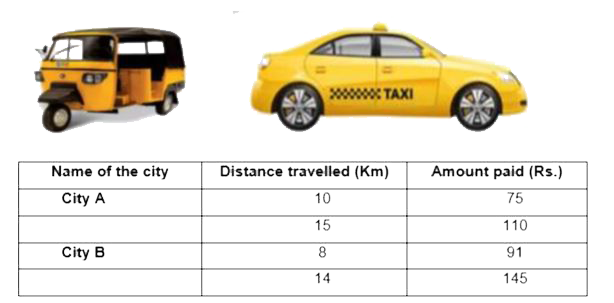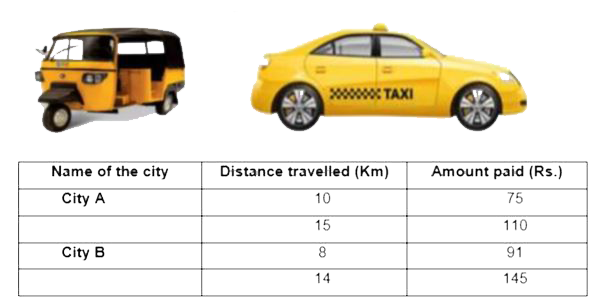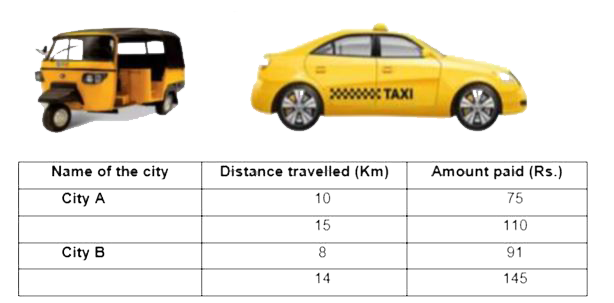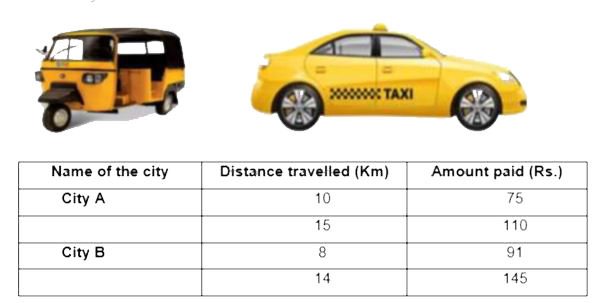The taxi charges in a city comprise of a fixed charge, together with the charge of the distance covered. For a journey of 16 km, the charges paid are Rs 156 and for a journey of 24 km, the charges paid are Rs 204. What will a person have to pay for travelling a distance of 30 km? (a) Rs 236 (b) Rs 240 (c) Rs 248 (d) Rs 252
Rs. 236
Rs. 240
Rs. 248
Rs. 252
The correct Answer is:B
Let the fixed charge be Rs. X and the distance charge be Rs. Y per km.
∴X+16Y=156 ....(i)
X+24Y=204 ..(ii)
We get from (i) and (ii), X = 60, Y = 6
∴ Cost to be paid for a distance of 30 kms
= 60 + 30 Y
=60+30×6=Rs.240
Topper's Solved these Questions
- BOOK - MCGROW HILL PUBLICATIONCHAPTER - ARITHMETICAL REASONING TEST EXERCISE - EXERCISE25videos
ARITHMETICAL REASONING TEST
- BOOK - MCGROW HILL PUBLICATIONCHAPTER - ARITHMETIC PROGRESSION (A.P.)EXERCISE - MULTIPLE CHOICE QUESTIONS15videos
ARITHMETIC PROGRESSION (A.P.)
- BOOK - MCGROW HILL PUBLICATIONCHAPTER - ASSIGNMENT - 4 (PROBLEMS ON RANKING TEST)EXERCISE - MCQs14videos
ASSIGNMENT - 4 (PROBLEMS ON RANKING TEST)
Similar Questions
The car hire charges in a city comprise of a fixed charges together with the charge for the distance covered. For a journey of 12 km, the charge paid is Rs 89 and for a journey of 20 km, the charge paid is Rs 145. What will a person have to pay for travelling a distance of 30 km?
View SolutionThe taxi charges in a city comprise of a fixed charge together with the charge for the distance covered. For a journey of 10 km the charge paid is Rs 75 and for a journey of 15 km the charge paid is Rs 110. What will a person have to pay for travelling a distance of 25 km?
View Solution
Knowledge Check
- Question 1 - Select One
A private taxi company charges a fixed charge along with a per kilometre charge based on the distance covered. For a journey of 24 km, the charges paid are Rs. 368 and for a journey of 32 km, the charges paid Rs. 464. How much will a person have to pay for travelling a distance of 15 km?
ARs. 180BRs. 260CRs. 290DRs. 280 - Question 2 - Select One
The autorickshaw fare consists of a fixed charge together with the charge for the distance covered. For a journey of 10 km, the charge paid is 85 and for a journey of 15 km, the charge paid is 120. The fare for a journey of 25 km will be
A175B190C180D225
The taxi charges in a city consist of a fixed charge together with the charge for the distance covered. For a distance of 20 km, the charge paid is 205 and for a distance of 25 km, the charge paid is 255. Find the fixed charges and the charge per km. How much does a person have to pay for covering a distance of 50 km? Sol. Let the fixed charges be x and charge per km be y.
View Solution[" (IV) The taxi charges in a city consist of a fixed charge together with the charge for the "],[" distance covered.For a distance of "10km" ,the charge paid is "₹105" and for a "],[" journey of "15km" ,the charge paid is "₹155" .What are the fixed charges and the "],[" charge per km? How much does a person have to pay for travelling a distance of "],[25km" ? "]
View SolutionIt is common that Governments revise travel fares from time to time based on various factors such as inflation ( a general increase in prices and fall in the purchasing value of money) on different types of vehicles like auto, Rickshaws, taxis, Radio cab etc. The auto charges in a city comprise of a fixed charge together with the charge for the distance covered. Study the following situations

Situation 1: In city A, for a journey of 10 km, the charge paid is Rs 75 and for a journey of 15 km, the charge paid is Rs 110.
Situation 2: In a city B, for a journey of 8km, the charge paid is Rs91 and for a journey of 14km, the charge paid is Rs 145.
The graph of lines representing the conditions are: (situation 2)View SolutionIt is common that Governments revise travel fares from time to time based on various factors such as inflation ( a general increase in prices and fall in the purchasing value of money) on different types of vehicles like auto, Rickshaws, taxis, Radio cab etc. The auto charges in a city comprise of a fixed charge together with the charge for the distance covered. Study the following situations

Situation 1: In city A, for a journey of 10 km, the charge paid is Rs 75 and for a journey of 15 km, the charge paid is Rs 110.
Situation 2: In a city B, for a journey of 8km, the charge paid is Rs91 and for a journey of 14km, the charge paid is Rs 145.
Refer to situation 2:
What will a person have to pay for travelling a distance of 30km?View SolutionIt is common that Governments revise travel fares from time to time based on various factors such as inflation ( a general increase in prices and fall in the purchasing value of money) on different types of vehicles like auto, Rickshaws, taxis, Radio cab etc. The auto charges in a city comprise of a fixed charge together with the charge for the distance covered. Study the following situations

Situation 1: In city A, for a journey of 10 km, the charge paid is Rs 75 and for a journey of 15 km, the charge paid is Rs 110.
Situation 2: In a city B, for a journey of 8km, the charge paid is Rs91 and for a journey of 14km, the charge paid is Rs 145.
If the fixed charges of auto rickshaw be Rs x and the running charges be Rs y km/hr, the pair of linear equations representing the situation isView SolutionIt is common that Governments revise travel fares from time to time based on various factors such as inflation ( a general increase in prices and fall in the purchasing value of money) on different types of vehicles like auto, Rickshaws, taxis, Radio cab etc. The auto charges in a city comprise of a fixed charge together with the charge for the distance covered. Study the following situations

Situation 1: In city A, for a journey of 10 km, the charge paid is Rs 75 and for a journey of 15 km, the charge paid is Rs 110.
Situation 2: In a city B, for a journey of 8km, the charge paid is Rs91 and for a journey of 14km, the charge paid is Rs 145.
Refer to situation 1:
A person travels a distance of 50km. The amount he has to pay isView Solution

